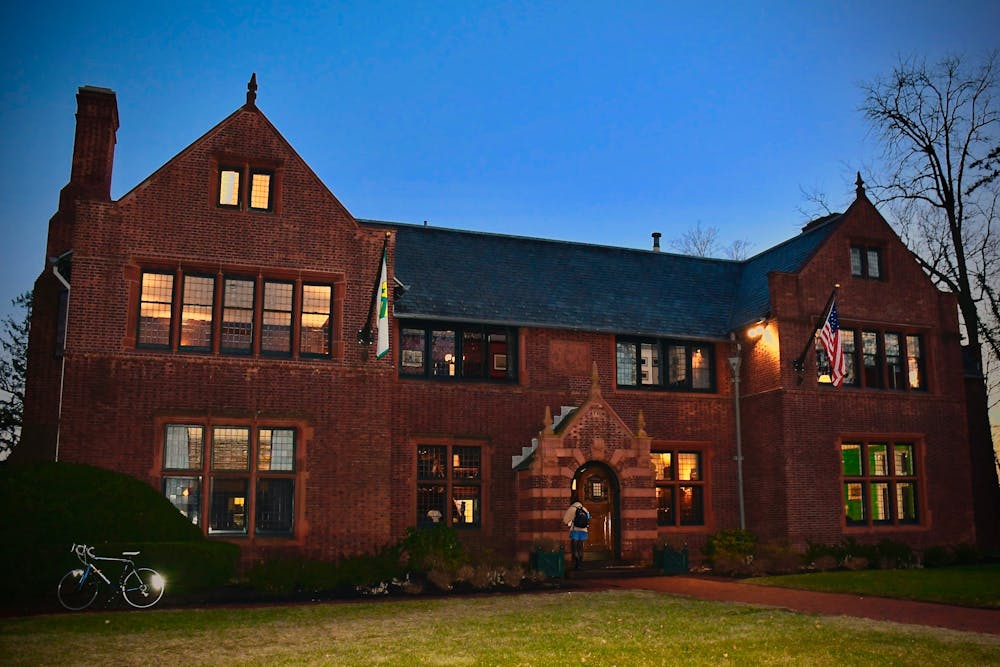When he checks your prox at the front door of Ivy Club, Nick DeStefano may come off as intimidating. He’s a self-described “big guy,” with a muscular, sturdy build and a certain aura of confidence.
On a Saturday afternoon, sitting down for an interview at Starbucks, DeStefano holds his venti iced coffee cup with a strong grip. He takes his coffee milky and sweet, with a few pumps of vanilla; less than an hour earlier, during his first time at Small World Coffee, he ordered an iced vanilla latte.
Within a few minutes of conversation, DeStefano’s confidence remains, but his intimidation fades. Often breaking out into a huge smile, it is apparent that he’s as sweet as his coffee. It is also a good thing that he likes his caffeinated beverages: he’s got a long night ahead, working later from 10 p.m. to 2:30 a.m. at Ivy Club.
DeStefano is used to these hours. He’s been doing security since he was 19 years old, starting at clubs in downtown Trenton. At the time, he was already working two jobs, but was looking for another source of income. A friend introduced him to a security gig at a nightclub, and he enjoyed it, since working at the front door had its perks.
Apart from solid pay, the job brought decent live music acts and an exciting atmosphere.
“You get to go out and get paid for it,“ he said.
The job also entailed occasional personal security gigs for somewhat famous celebrities, such as Beenie Man and The Smithereens.
But working security was far from easy.

“I’ve seen some stuff,” laughed Destefano. “I’ve been shot at, I’ve had knifes pulled. I’ve confiscated a full clip off of a gentleman. The weirdest thing I ever confiscated was a skewer fork.”
Week after week, DeStefano put himself at physical risk, unsure of what the night would entail. Some weeks, there were crowds breaking furniture, and extremely violent drunks. There were countless people who would refuse to leave the club at the end of the night.
“One of the more dangerous ones was high on PCP — he didn’t feel anything,” DeStefano recalled. “It took eight people to get him to go.”
Another memorable night, a night club became a “gang war area.”

When starting out as a bouncer, DeStefano had no formal self-defense training. A year into the job, a coworker introduced DeStefano to Krav Maga, a form of Israeli martial arts that originated as a self-defense system for the Israeli army.
“Krav Maga changed my life for the better,” DeStefano asserted.
The rigorous physical training helped DeStefano lose 60 pounds, and he slowly began to feel certain that he could defend himself in any situation. The mental practices encompassed in Krav Maga started to have profound impacts, too.
“It turned into a lifestyle,” said DeStefano. “It added a whole lot more confidence to my life. I feel like I can walk anywhere and have my head held high.”
Despite a newfound confidence, four years into working security at nightclubs, DeStefano reached a point where he had seen enough. The job was beginning to put a strain on his personal relationships, and he was ready to put work as a bouncer aside. Other sources of income would suffice to make ends meet.
DeStefano began working retail in Hamilton Township, in New Jersey. For the past eight years, DeStefano has worked security at a jewelry store — a “steady gig.”
According to DeStefano, matters became more challenging after a separation from his wife a few years ago. Fighting to make ends meet, he moved in with his parents. He said he was eager to establish himself as a good role model for his son, over whom he has equal custody.
“I’m trying to make it work for my family,” DeStefano said. “It does get tough now and then.”
At the time, DeStefano had been vying for an additional source of revenue so that he could move out from his parents’ house. So, last September, when he received a call from a friend about working another security gig, he was all ears. His friend owned a security company called RK Management, which offers security services to several of the eating clubs (Terrace Club, Cottage Club, and Ivy) at the University.
On his first day on the job — Lawnparties 2018 — DeStefano was immediately excited to see Waka Flocka Flame across the street from his stance at the entrance of Ivy. DeStefano recalls the day fondly: students spraying him with water to ease the heat, and everyone enjoying themselves.
“That set the tone,” DeStefano remembers. “It was a good atmosphere. I knew it wouldn’t be where I was before.”
So DeStefano has continued working security at the University during nights out, and he doesn’t foresee himself stopping any time soon.
His schedule varies week by week, according to the demands of his boss. He mostly works at Ivy, providing security on occasional Tuesday and Thursday nights, and most Saturdays. He’s also worked at Cottage and Terrace, too.
“Each club is a little different,” DeStefano noted, but he has not found any huge discernible differences in the student body.
However, DeStefano alluded to stratification in the University’s campus.
“I don’t want to say it’s clique-y, but you can tell,” he remarked. “You can tell who the jocks are.”
On the whole, DeStefano has found the job easier than anticipated.
“It was way more laid back than I thought it was going to be,” said DeStefano. “Let’s be honest, Princeton isn’t a rowdy kind of a place. I’ve come from places where we’ve had to be on high alert all the time.”
DeStefano has learned the tricks that students try and pull off for entryway. He has yet to see a fake prox, but there’s frequent prox-swapping between friends, and the classic maneuver of the “prox passback” where one person gets in, and passes their prox back.
Unlike his previous gigs, nights out at the University became predictable, seamless affairs.
“We get in at 10:30. First one there brews the coffee,” DeStefano explained. “We get two lists: the normal list and the out-of-town list. We go to our positions. At 2:15, we shut the music down, and at 2:30, we close.”
Despite the numerous interchanging faces, DeStefano began to recognize the Ivy regulars: around 30 members whom he can pick out, equal numbers across gender lines.
“We’re friendly, not friends,” he said.
At the start of the night, he’ll now look the list for the regular attendees, too.
“If you talk to me, I’ll remember you,” DeStefano said.
On the whole, DeStefano’s impressions of students are overwhelmingly positive. Students have asked DeStefano about how his son is doing, and he enjoys hearing about their accomplishments in school and outside the classroom.
It’s common that students who are not on the list get upset, but DeStefano finds the spectacles mildly amusing.
“It’s not us laughing at you, it’s us laughing with you,” DeStefano said. “Sometimes it’s a little ridiculous. Like when you start spelling your last name … When someone hears they aren’t on the list, it’s as if it’s the worst thing in the world.”
There have been a few incidents that were more serious, regarding students that DeStefano knows “the bad way”: light drug use and being “drunk and disorderly.” Getting on the notorious “Ivy blacklist” is rare, but it will happen with drug use. Another common occurrence is students jumping on the pool tables in the club.
Still, these problems are mild to DeStefano
“We don’t make the rules, we just enforce them,” DeStefano noted. “And if you don’t comply, we’re going to have to force you to leave.”
Four times, DeStefano has removed students from the Ivy premises. And, after each of these four occurrences, the respective student has returned to the club to apologize.
A month ago, DeStefano had to physically remove someone who was not listening. The following week, the member came back, apologized, and shook DeStefano’s hand. During another incident, a student kicked over several cups by the entryway in a fit of rage. The student came back and apologized to the whole staff for the mess he created. To DeStefano, these apologies speak to the general nature of University students: respectful, and not looking to cause problems.
DeStefano also values the company of his fellow bouncers, people who “always have his back.” He doesn’t know every bouncer on the Street, but he has a couple close friends whom he calls “family.” Working with them, the job is more enjoyable.
“It’s peaceful work. We want you to have fun,” DeStefano said. “And if you have fun, we feed off that fun.”
At the end of the day, DeStefano sees intoxicated Princeton students — perhaps upset about not being on the list, mad that their friends ditched them, frantically looking for their coat — as non-threatening kids, throwing mini temper tantrums.
“We’re just making sure you don’t do anything that’s going to hurt yourself or anybody else,” he remarked. “It’s pretty much just babysitting.”








